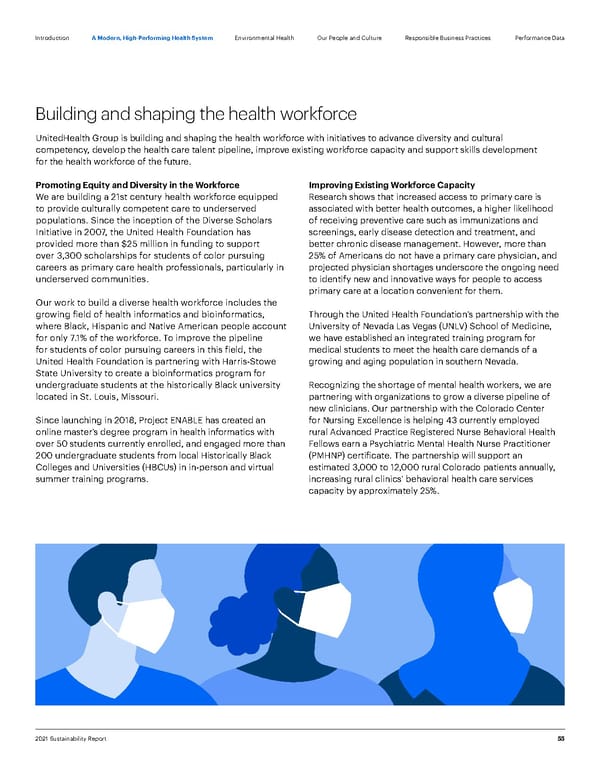Introduction 55 2021 Sustainability Report A Modern, High-Performing Health System Our People and Culture Environmental Health Responsible Business Practices Performance Data UnitedHealth Group is building and shaping the health workforce with initiatives to advance diversity and cultural competency, develop the health care talent pipeline, improve existing workforce capacity and support skills development for the health workforce of the future. Building and shaping the health workforce Promoting Equity and Diversity in the Workforce We are building a 21st century health workforce equipped to provide culturally competent care to underserved populations. Since the inception of the Diverse Scholars Initiative in 2007, the United Health Foundation has provided more than $25 million in funding to support over 3,300 scholarships for students of color pursuing careers as primary care health professionals, particularly in underserved communities. Our work to build a diverse health workforce includes the growing field of health informatics and bioinformatics, where Black, Hispanic and Native American people account for only 7.1% of the workforce. To improve the pipeline for students of color pursuing careers in this field, the United Health Foundation is partnering with Harris-Stowe State University to create a bioinformatics program for undergraduate students at the historically Black university located in St. Louis, Missouri. Since launching in 2018, Project ENABLE has created an online master’s degree program in health informatics with over 50 students currently enrolled, and engaged more than 200 undergraduate students from local Historically Black Colleges and Universities (HBCUs) in in-person and virtual summer training programs. Improving Existing Workforce Capacity Research shows that increased access to primary care is associated with better health outcomes, a higher likelihood of receiving preventive care such as immunizations and screenings, early disease detection and treatment, and better chronic disease management. However, more than 25% of Americans do not have a primary care physician, and projected physician shortages underscore the ongoing need to identify new and innovative ways for people to access primary care at a location convenient for them. Through the United Health Foundation’s partnership with the University of Nevada Las Vegas (UNLV) School of Medicine, we have established an integrated training program for medical students to meet the health care demands of a growing and aging population in southern Nevada. Recognizing the shortage of mental health workers, we are partnering with organizations to grow a diverse pipeline of new clinicians. Our partnership with the Colorado Center for Nursing Excellence is helping 43 currently employed rural Advanced Practice Registered Nurse Behavioral Health Fellows earn a Psychiatric Mental Health Nurse Practitioner (PMHNP) certificate. The partnership will support an estimated 3,000 to 12,000 rural Colorado patients annually, increasing rural clinics’ behavioral health care services capacity by approximately 25%.
 ESG Report | UnitedHealth Group Page 54 Page 56
ESG Report | UnitedHealth Group Page 54 Page 56